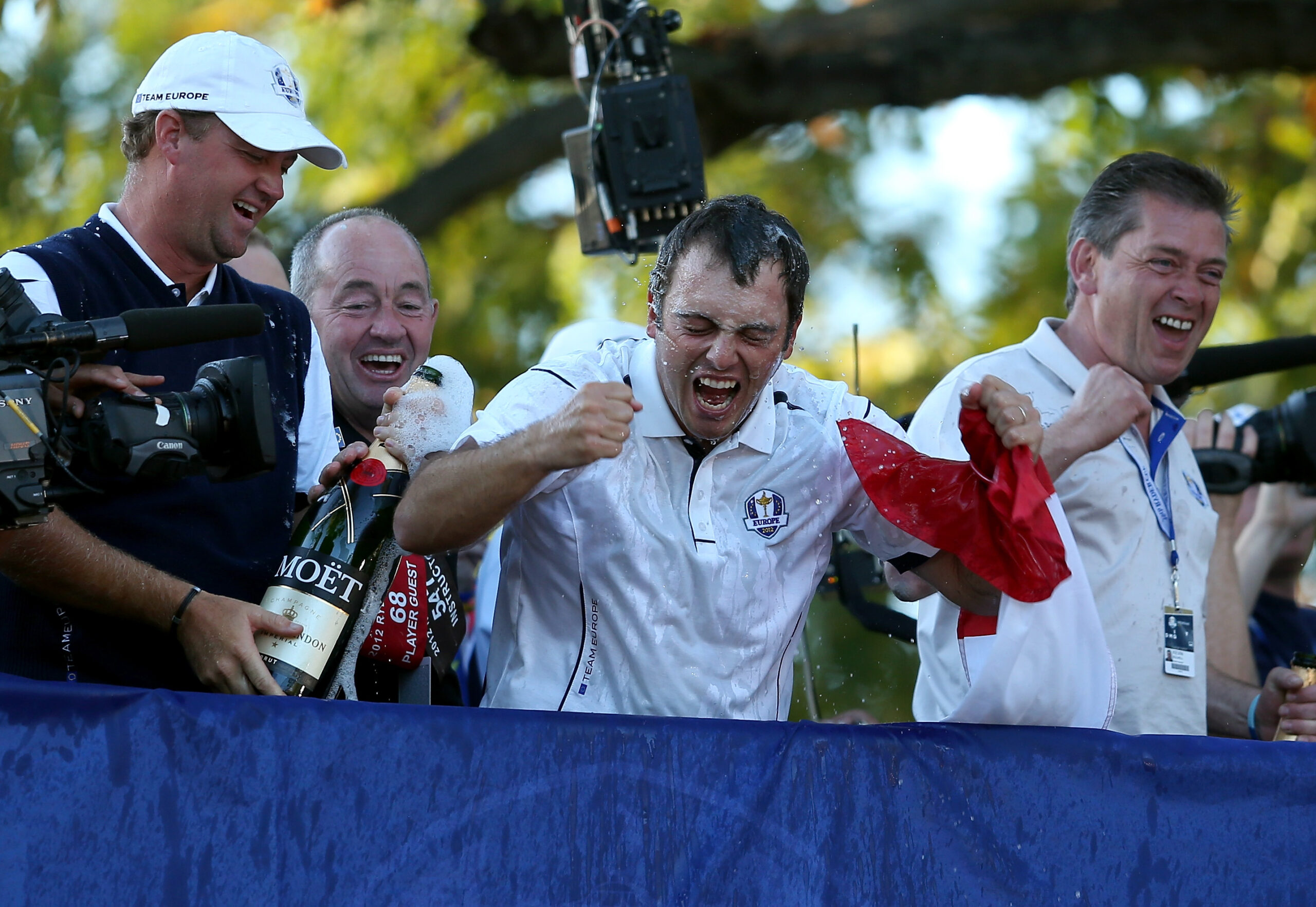At the 2025 Ryder Cup at Bethpage, Luke Donald will aim to oversee just the fifth victory by a European team on U.S. soil.
No team has won an away Ryder Cup since the “Miracle at Medinah” in 2012, which followed on from prior success for Team Europe on the road in 1987, 1995 and 2004.
Here, as part of a series focusing on European successes in the U.S., Francesco Molinari recalls his memories of 2012 and being part of one of the most memorable European teams in history.
An away Ryder Cup is among sport’s greatest challenges.
From the course set-up, partisan fan support and being in control of the tournament week environment, the home side have several factors that give them the upper hand.
While there is nothing quite like the first-tee experience at the biennial match play contest, the nervous excitement perhaps only ramps up on US soil.
In sport, when you’re under the most pressure, a team often forges a siege mentality and comes together.
So, while Francesco Molinari was part of the winning team on his Ryder Cup debut at Celtic Manor in 2010, the spectacle of teeing it up on the road at Medinah Country Club two years later was something else entirely.
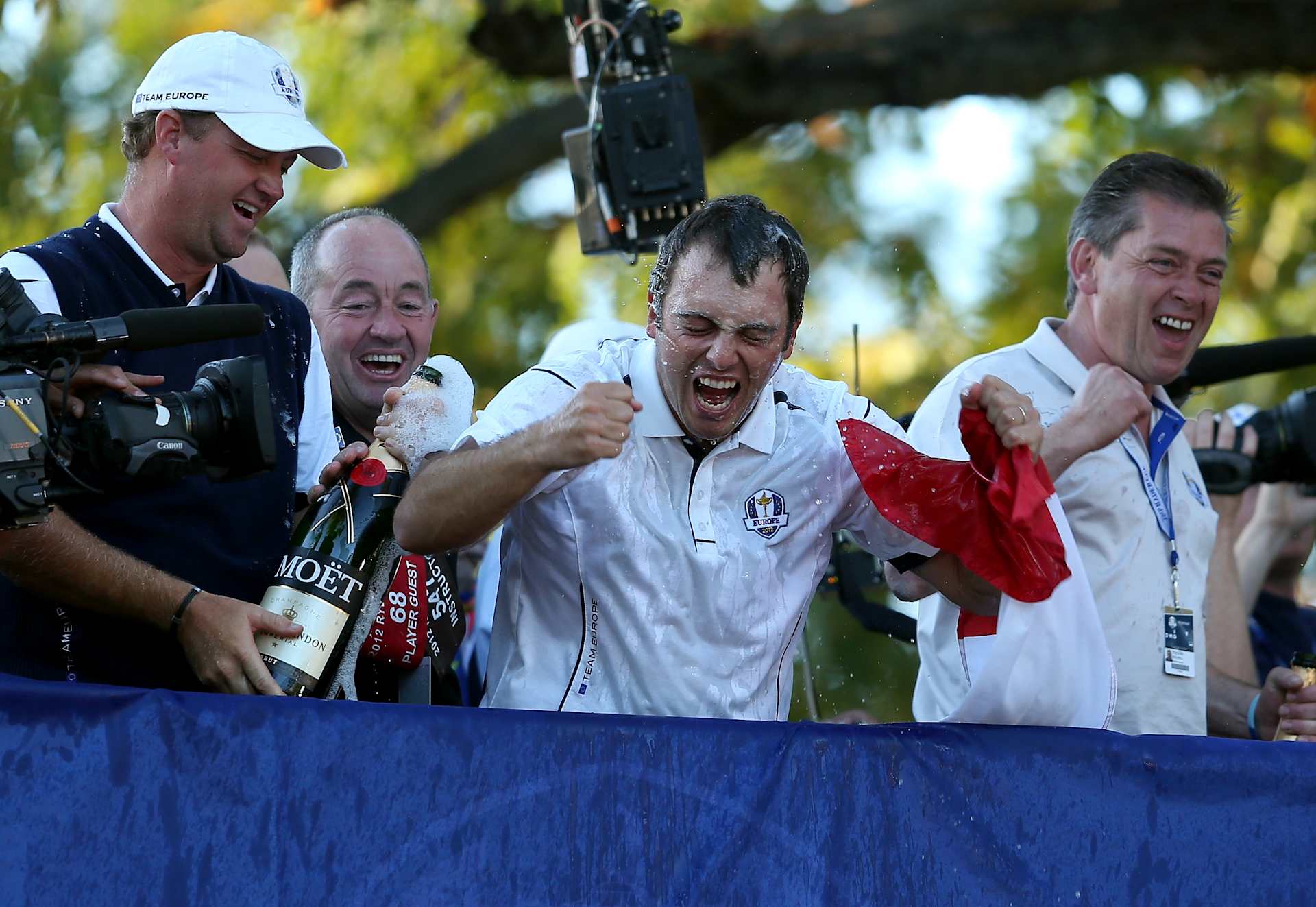 MEDINAH, IL – SEPTEMBER 30: Francesco Molinari (C) and Peter Hanson celebrate after Europe defeated the USA 14.5 to 13.5 to retain the Ryder Cup during the Singles Matches for The 39th Ryder Cup at Medinah Country Club on September 30, 2012 in Medinah, Illinois. (Photo by Andy Lyons/Getty Images)
MEDINAH, IL – SEPTEMBER 30: Francesco Molinari (C) and Peter Hanson celebrate after Europe defeated the USA 14.5 to 13.5 to retain the Ryder Cup during the Singles Matches for The 39th Ryder Cup at Medinah Country Club on September 30, 2012 in Medinah, Illinois. (Photo by Andy Lyons/Getty Images)“You feel like you’re a small group in enemy territory,” he said.
“There is definitely a strong bond within the team when you are playing.”
Since players from continental Europe were added to the roster for the 1979 Ryder Cup, their identity has been based around its togetherness.
In 2012, Europe featured players from eight countries, with Molinari the sole representative from Italy as one of five members of the team featuring on US soil for the first time.
“Back then, it was a little bit of a shock,” he added.
“I was expecting it to be different but little stuff like the set-up of the golf course and when I was hitting good shots into the greens, people not clapping or reacting was tough, throwing me off a little bit.
“But there are positives and negatives. I think it is easier in a way when you play away from home to sort of stick together as a group between the players, the captain and the caddies.”
As Molinari alludes to, the expectation is for the home team to win.
History says so, with only three European sides winning in America – in 1987, 1995 and 2004 – leading up to the 2012 edition in Illinois.
On the opening day, Molinari, who played alongside his brother Edoardo on his Ryder Cup debut in Wales, teamed up with experienced Englishman Lee Westwood in the morning foursomes.
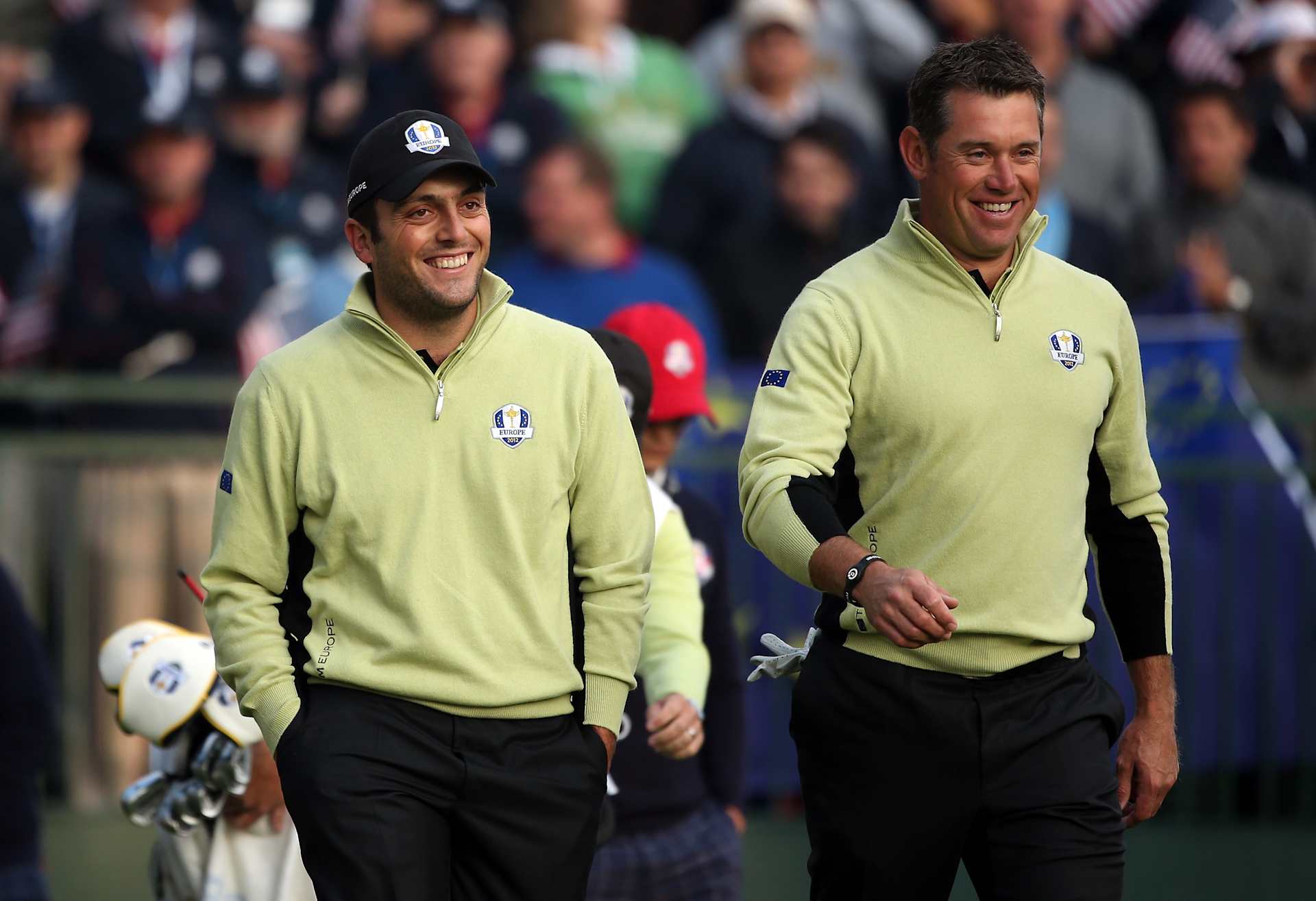 MEDINAH, IL – SEPTEMBER 28: Lee Westwood and Francesco Molinari of Europe on the first hole during the Morning Foursome Matches for The 39th Ryder Cup at Medinah Country Club on September 28, 2012 in Medinah, Illinois. (Photo by Andrew Redington/Getty Images)
MEDINAH, IL – SEPTEMBER 28: Lee Westwood and Francesco Molinari of Europe on the first hole during the Morning Foursome Matches for The 39th Ryder Cup at Medinah Country Club on September 28, 2012 in Medinah, Illinois. (Photo by Andrew Redington/Getty Images)Despite defeat to Major champion Jason Dufner and Zach Johnson, Europe shared the opening session, only for the hosts to seize the initiative by winning three of the afternoon fourballs to lead 5-3 at the end of day one.
“It was tough already from day one,” reflected Molinari, who missed the afternoon session. “Even though the score maybe wasn’t terrible, we felt the momentum was all with the Americans.
“They were making a lot more putts than us. They were obviously getting energy from the crowds, reacting to their putts going in.”
The US further strengthened their control with a dominant performance in Saturday’s morning foursomes session, forging into an 8-4 advantage.
Things only got worse in the afternoon as Molinari and Justin Rose were on the losing end of a one-sided match, before Belgian rookie Nicolas Colsaerts and Paul Lawrie suffered defeat on the 18th.
At 10-4 down, Europe were facing defeat.
But dramatic late points for Luke Donald and Sergio Garcia, and Rory McIlroy and an inspired Ian Poulter – the latter two recovering from two down with six to play – reduced the deficit to 10-6.
And yet, despite Poulter celebrating a remarkable fifth consecutive birdie to seal a dramatic point for Europe against Dufner and Johnson, hope of a comeback appeared slim.
Since the competition expanded to include mainland Europe it had been done just once, when the US overhauled a 10-6 deficit to win by a single point at Brookline in 1999.
“When he [Poulter] made the putt on 18 and turned towards us as a group, it really gave us a lot of energy going into Sunday,” he said.
“If we hadn’t won those two games on the Saturday, we really didn’t stand a chance on the Sunday.”
A three-time winner on the DP World Tour at the time, Molinari had struggled to perform to his best in his two matches, like several of his team-mates.
So, as is so often the case, the line-up of Sunday’s singles took on even greater significance.
On paper, both teams were evenly matched with nine players – five on the U.S. side and four in the European fold – in the world’s top ten.
The then World Number 31, Molinari’s preference was to play later rather than earlier, revealing he only learned he would play in the final match of the day and of his opponent – Tiger Woods for the second Ryder Cup in succession – after arriving back at the hotel late on Saturday evening.
“When the last few games finished on Saturday, José María Olazábal and his Vice Captains sat down in the team room and called us in one by one just to have a chat and see what we wanted to do, felt comfortable doing,” he said.
“I don’t remember the exact number, but initially I was going to play in the first part of the singles, and I told them I would like to play a little later.
“At the time, I normally preferred to play later in the day than early in the morning.
“I left it at that and then we got back to the hotel and by the time we got back to the hotel the singles line-up was out.
“I found out like that that I was last out, and I was playing against Tiger again like two years before.”
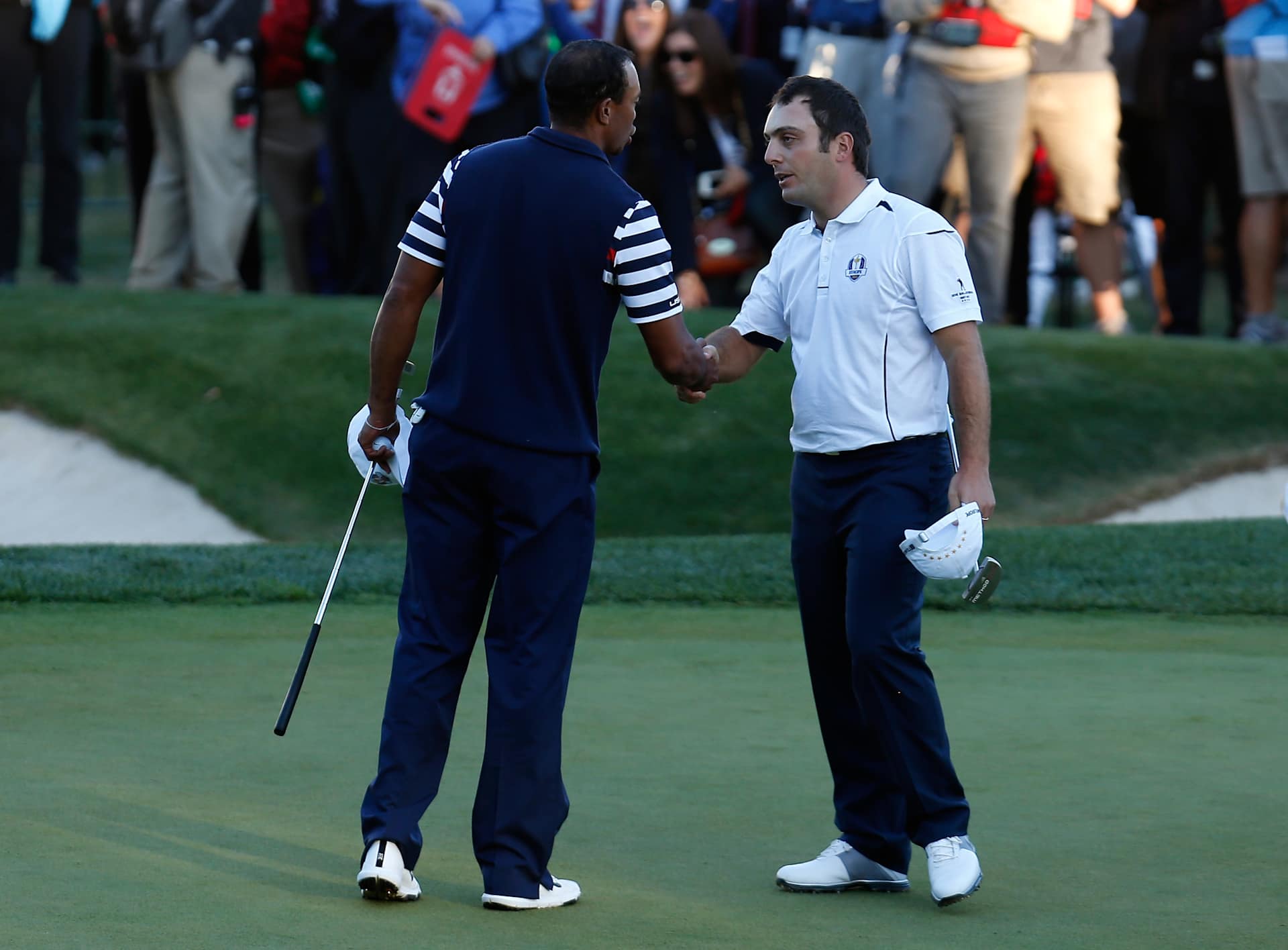 MEDINAH, IL – SEPTEMBER 30: Francesco Molinari of Europe (R) shakes hands with Tiger Woods of the USA on the 18th green after halving his match with Woods during the Singles Matches for The 39th Ryder Cup at Medinah Country Club on September 30, 2012 in Medinah, Illinois. (Photo by Jamie Squire/Getty Images)
MEDINAH, IL – SEPTEMBER 30: Francesco Molinari of Europe (R) shakes hands with Tiger Woods of the USA on the 18th green after halving his match with Woods during the Singles Matches for The 39th Ryder Cup at Medinah Country Club on September 30, 2012 in Medinah, Illinois. (Photo by Jamie Squire/Getty Images)After a 4&3 defeat to the American great in the singles at Celtic Manor, coupled with the match situation of the contest, there was no shortage of motivation for Molinari as he sought his first full point in the European colours.
As the points started to come in, with Europe charging out of the blocks to win the first five singles matches, attention switched to the matches lower down.
“On one hand it is nerve-wracking and on the other it is a nice feeling,” recalled Molinari.
“You’d much rather that position than with the cup already being lost. You feel proud of what the first few games are doing, what your team-mates are doing.
“For me personally, especially playing against Tiger, it was just about staying in the game as long as possible. It was a pretty tight game.
“You’re just trying not to give away any holes, play solid golf and take it to the last few holes.”
With 14 points required to retain the trophy, Martin Kaymer – playing in the penultimate match – holed a nerveless five-foot par putt to seal victory against Steve Stricker and reach the mark.
But it was left to Molinari to seal an overall victory, with a bogey by Woods on the final green giving Europe a historic 14½-13½ win.
“It was complete chaos,” said Molinari. “I wasn’t even sure what to do after [Martin’s putt]. I checked with Olazábal that I needed to keep playing, it matters if we win or just tie.
“Everything around us was just going off with the European celebrations, the Americans being deflated and spectators starting to leave the course. It was a surreal finish.
“I was obviously very happy to see Martin hole that putt.”
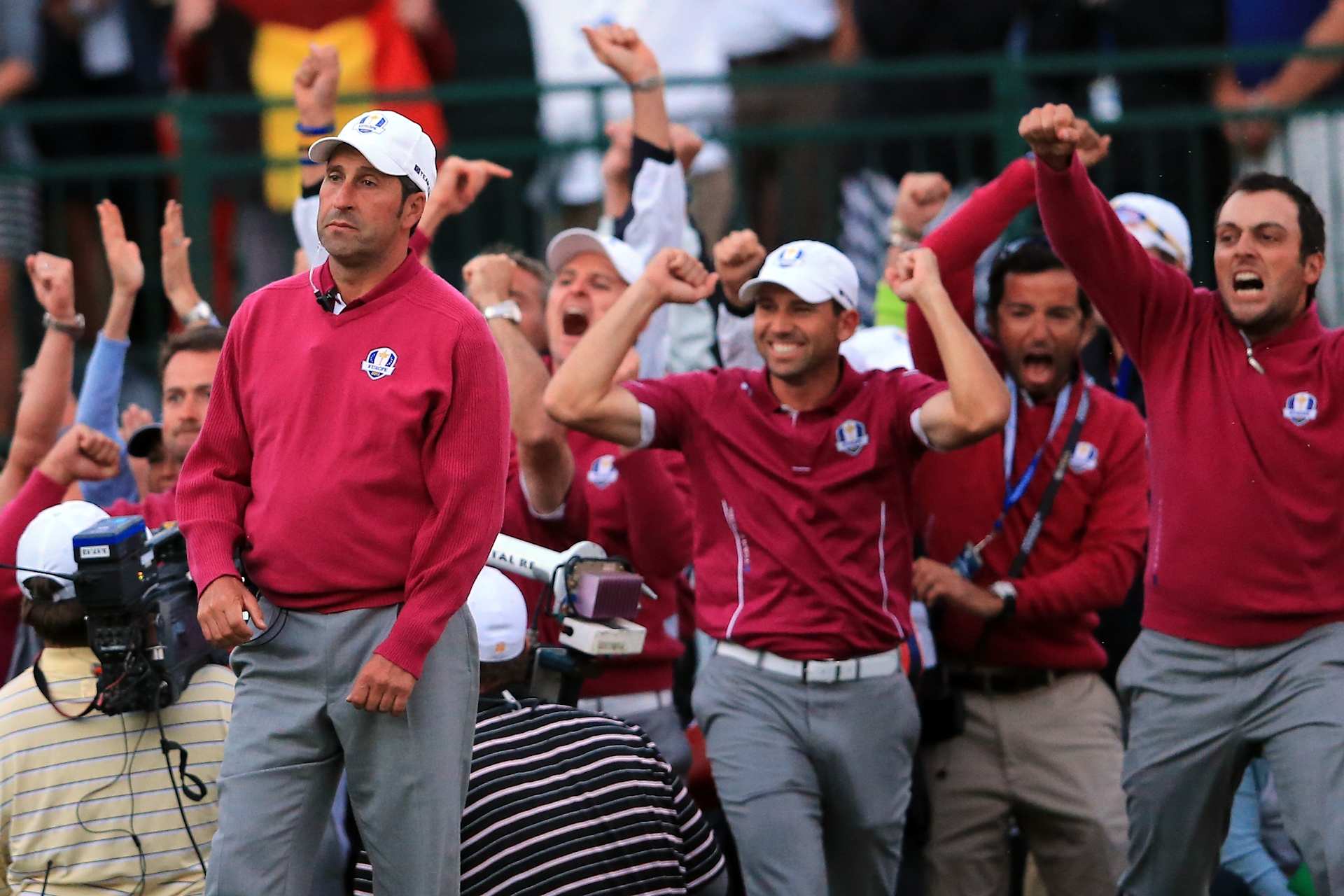 MEDINAH, IL – SEPTEMBER 29: Europe team captain Jose Maria Olazabal (L) watches alongside Sergio Garcia and Francesco Molinari on the 18th green during day two of the Afternoon Four-Ball Matches for The 39th Ryder Cup at Medinah Country Club on September 29, 2012 in Medinah, Illinois. (Photo by David Cannon/Getty Images)
MEDINAH, IL – SEPTEMBER 29: Europe team captain Jose Maria Olazabal (L) watches alongside Sergio Garcia and Francesco Molinari on the 18th green during day two of the Afternoon Four-Ball Matches for The 39th Ryder Cup at Medinah Country Club on September 29, 2012 in Medinah, Illinois. (Photo by David Cannon/Getty Images)With Europe wearing the Spaniard’s trademark navy blue and white, the final-day comeback was a fitting tribute to Seve Ballesteros, who passed away in 2011.
“I like to think that he [Ballesteros] was part of what happened that Sunday,” said Molinari.
“Every time you wear the shirt, he is the first guy that comes to your mind. With his passing, it was even more evident and even more explicit.
“With Olazábal being the captain, he still is the best person possible to convey Seve’s message and legacy and that is what makes the European Ryder Cup teams so special.
“Wearing that shirt just gives you goosebumps every time.”
Molinari will join Olazábal as a Vice Captain in New York at Bethpage later this month, aiming to play his part again in a winning European cause as Luke Donald’s side look to write their name into the history books.
